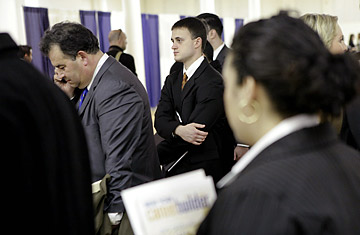
The chances that unemployment will hit 10% by mid-summer has ruined almost all of the plans of the administration.
When Bob Schieffer of Face The Nation asked Secretary Geithner if the Administration would have to go back to Congress for more stimulus money because of rapidly rising unemployment, the bureaucrat refused to answer directly, acting as if he believed he would be struck by a bolt of lightning if he did anything beyond dissembling.
If the budget, stimulus package, and bank bailout assumptions for employment and revenue are no longer right, the government's pot for solving the nation's economic problems is already light. The Administration's forecast is that unemployment will average 8.1% this year and 7.9% next year. The CBO estimates are a bit higher. Based on where unemployment stands now and where it will likely be at mid-year, none of those numbers is even remotely realistic. (See pictures of the Top 10 scared traders.)
The joblessness level reached 8.5% at in March because the number of people pushed out of work last month rose 663,000. Each time another 1.7 million people lose their jobs, the unemployment rate moves up another 1%, so if 2.6 million more Americans are fired, the jobless rate will hit 10%. At the current rate at which the economy is shedding workers the 10% level will be reached by the end of July. The counterargument to picking a date only four months from now is that the rate at which people are losing jobs will decelerate. Of course, there is no basis for that. Since the beginning of the year, the number of people being laid off has accelerated. (Find out 10 things to do with your money.)
If the Budget estimates are wrong, so are the "stress test" assumptions for the government's new program to determine which banks are in reasonable shape to make it through the recession and which are not. The test is based on unemployment reaching as high as 10%. If the number is likely to go well beyond that, the premise for evaluating the strength of key pillars of the financial system is deeply flawed before the evaluation process has been finished. The Administration wants to set measurements for whether large American private banks need to raise money. If 10% unemployment is a critical determining factor, many of the biggest financial firms will need extra capital. In the current credit environment, that cash is highly unlikely to come from any source other than the U.S. government. In that case, the sums needed for the TARP and other programs will almost certainly increase. And, the amount could easily be several hundred billion more dollars. Rising unemployment will also move the budget deficit higher by several hundred billion more dollars in the next two years because of the need for additional capital to stimulate the economy and a shortfall in tax revenue from people who were not supposed to be out of work. (See pictures of the global financial crisis.)
Almost all of this data has been evaluated for the better part of a week. The more it is examined, the clearer it becomes why no senior person in the Administration wants to take on the issue of "how much money is going to be enough." The amounts by which all of the current programs to stimulate the economy, underwrite the banking system, and help millions of people with mortgages is so much larger that was planned just three months ago that it is not realistic to think that the Congress will provide another enormous infusion of funds or that the Treasury has the capacity to borrow them.
The free market crowd still wants to let the capitalist system sort itself out without substantial government intervention. They posit that, no matter how painful the adjustment, it is better for the economy to move to or beyond the brink of collapse on its own so that the resulting inexpensive labor, goods, and services can eventually cause a tiny spark of demand which will eventually turn into a raging recovery. These analysts may be right, but nearly everyone is frightened by the prospect of the carnage which would go along with the economy "improving itself" without government intervention. If unemployment gets worse much faster and the government's plans for making the economy right are shattered soon, the free market movement will get its wish by default.
— Douglas A. McIntyre
See the 25 people to blame for the financial crisis.
For constant business updates, go to 24/7wallst.com.
